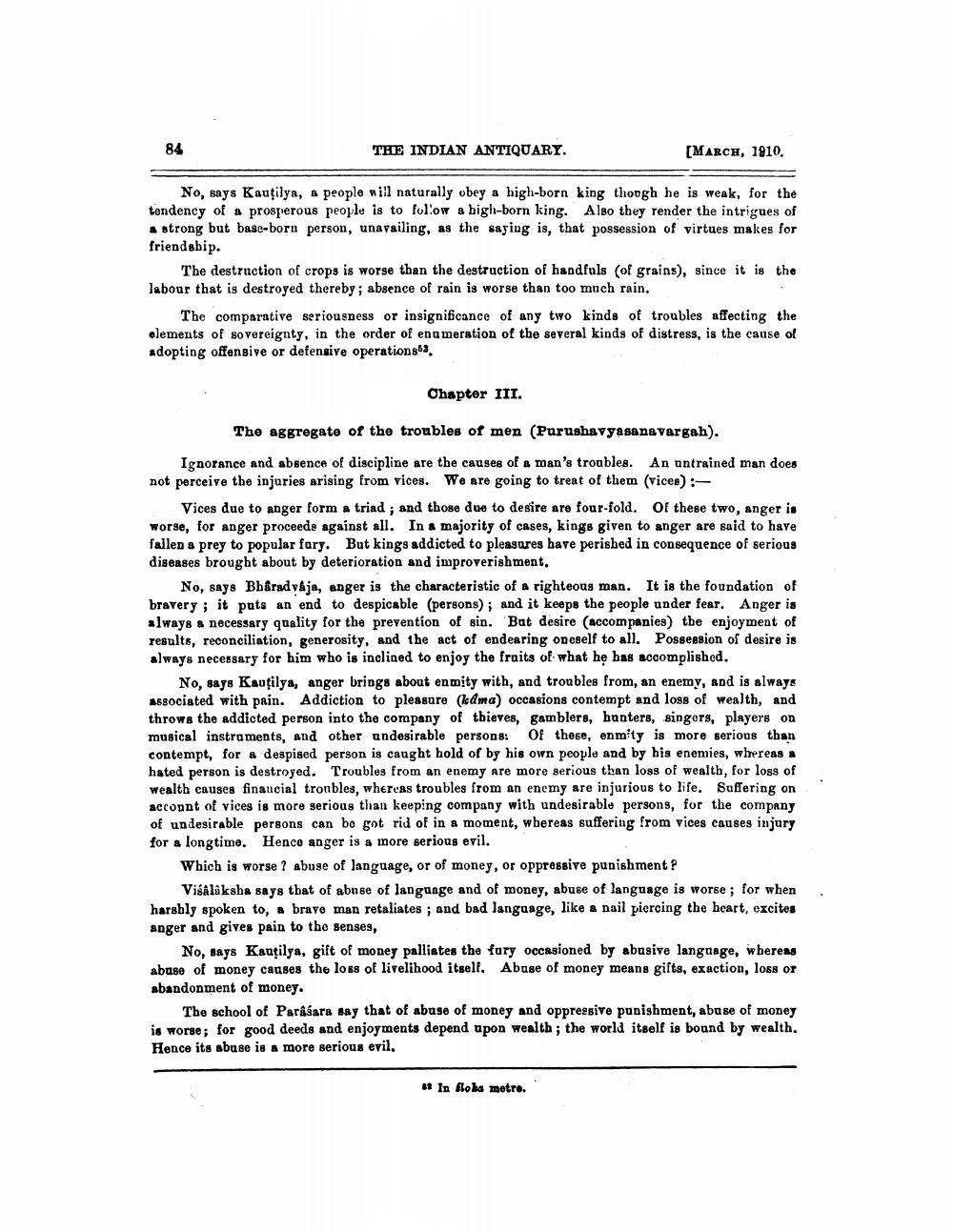________________
THE INDIAN ANTIQUARY.
[MARCH, 1910,
No, says Kautilya, a people will naturally obey a high-born king though he is weak, for the tendency of a prosperous people is to follow a bigh-born king. Also they render the intrigues of a strong but base-born person, unavailing, as the saying is, that possession of virtues makes for friendsbip.
The destruction of crops is worse than the destruction of handfuls (of grains), since it is the labour that is destroyed thereby; absence of rain is worse than too much rain.
The comparative seriousness or insignificance of any two kinds of troubles affecting the olements of sovereignty, in the order of ena meration of the several kinds of distress, is the cause of adopting offensive or defensive operations63.
Chapter III.
Tho aggregate of the troubles of men (Purushavyasanavargah).
Ignorance and absence of discipline are the causes of a man's troubles. An antrained man does not perceive the injuries arising from vices. We are going to treat of them (vices) :
Vices due to anger form a triad ; and those due to desire are four-fold. Of these two, anger is worse, for anger proceeds against all. In a majority of cases, kings given to anger are said to have fallen & prey to popular fary. But kings addicted to pleasares have perished in consequence of serious diseases brought about by deterioration and improverishment.
No, says Bharadvája, anger is the characteristic of a righteous man. It is the foundation of bravery ; it puts an end to despicable (persons); and it keeps the people under fear. Anger is always & necessary quality for the prevention of sin. Bat desire (accompanies) the enjoyment of results, reconciliation, generosity, and the act of endearing oneself to all. Possession of desire is always necessary for him who is inclined to enjoy the fruits of what he has accomplished.
No, says Kautilya, anger brings about enmity with, and troubles from, an enemy, and is always associated with pain. Addiction to pleasure (kama) occasions contempt and loss of wealth, and throws the addicted person into the company of thieves, gamblers, hunters, singers, players on musical instraments, and other undesirable persons: Of these, enmity is more serious than contempt, for a despised person is caught hold of by his own people and by his enemies, whereas a hated person is destroyed. Troubles from an enemy are more serious than loss of wealth, for loss of wealth causes financial troubles, whereas troubles from an enemy are injurious to life. Suffering on acconnt of vices is more serious than keeping company with undesirable persons, for the company of undesirable persons can bo got rid of in a moment, whereas suffering from vices causes injury for a longtime. Hence anger is a more serious evil.
Which is worse ? abuse of language, or of money, or oppressive punishment ?
ViśAlaksha says that of abuse of language and of money, abuse of language is worse ; for when harshly spoken to, a brave man retaliates ; and bad language, like a nail piercing the heart, excites anger and gives pain to the senses,
No, says Kautilya, gift of money palliates the fary occasioned by abusive language, whereas abase of money causes the loss of livelihood itsell. Abase of money means gifts, exaction, loss or abandonment of money.
The school of Parâšara say that of abuse of money and oppressive punishment, abuse of money is worse; for good deeds and enjoyments depend upon wealth; the world itself is bound by wealth. Hence its abuse is a more serious evil,
# In floka metro.




